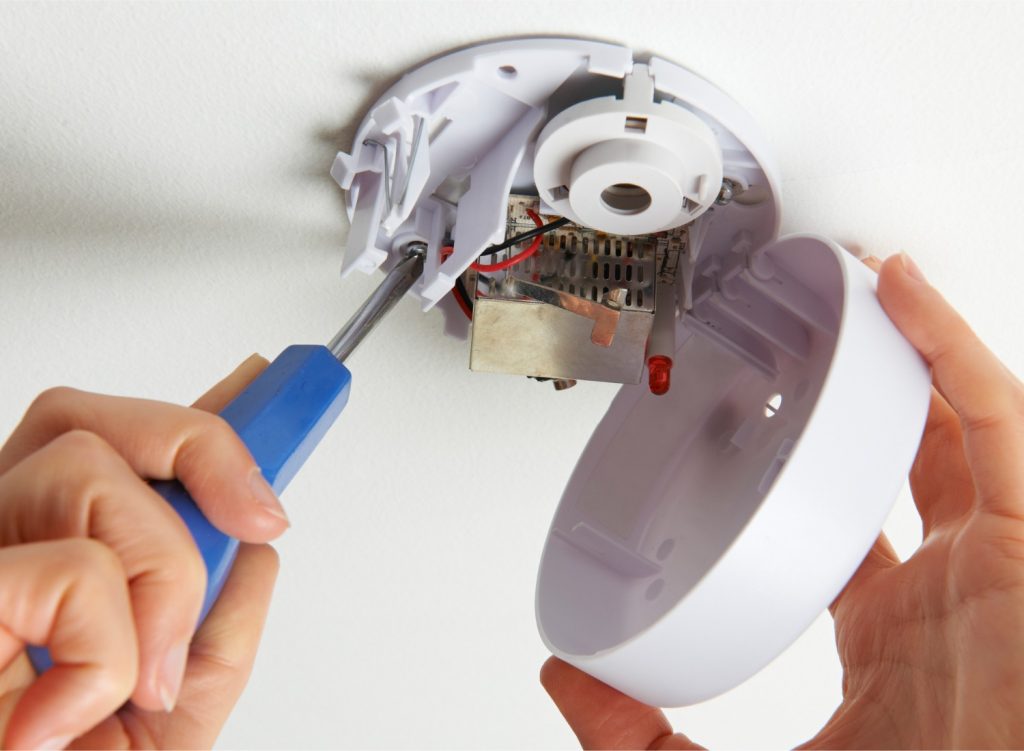How to Stop Smoke Detector From Chirping Without a Battery

The constant chirping of a smoke detector can be incredibly frustrating, especially when it seems to happen at the most inconvenient times. You might wonder how you can make it stop without replacing the battery. While a chirping smoke detector typically indicates a low battery, you can try a few methods to temporarily silence the annoying sound or troubleshoot the issue.
In this blog, we’ll explore these methods and provide valuable tips on dealing with a chirping smoke detector, ensuring a quieter and safer home. Whether you’re a homeowner, renter, or simply curious about smoke detector maintenance, this guide will help you tackle those persistent chirping alarms.
Smoke Detectors: The Basics
A smoke detector is a device designed to detect the presence of smoke in the air. It plays a crucial role in ensuring the early detection of fires and giving people enough time to evacuate safely.
Smoke detectors operate using two main methods: ionization and photoelectric sensing. Ionization smoke detectors use a small amount of radioactive material to ionize the air. In contrast, photoelectric smoke detectors utilize a light source and a light-sensitive sensor to detect smoke particles.
The Role of Batteries in Smoke Detectors
Smoke detectors need batteries to provide the necessary power for operation. In case of a power outage, the batteries act as a backup power source, ensuring the continuous functioning of the smoke detector.
Most smoke detector batteries last around one to two years, depending on the type and quality of the battery used. However, it’s recommended that you replace the batteries annually to ensure optimal performance.
Eliminating Causes for Smoke Detector Chirping
Checking the battery
Start by checking the battery of your smoke detector. If it’s low, replace it with a fresh one. Ensure that you’re using the correct type of battery as recommended by the manufacturer.
Cleaning the smoke detector
Dust and debris can interfere with your smoke detector’s functionality and cause false alarms or chirping. Clean the detector using a soft brush or duster to remove accumulated dust.
Resetting the smoke detector
If the chirping persists after changing the battery and cleaning the detector, try resetting the smoke detector. Refer to the manufacturer’s instructions for the correct reset procedure.
How to Stop Your Smoke Detector from Chirping
Disconnect the power supply
If you have a hardwired smoke detector, you can temporarily stop the chirping by disconnecting the power supply. However, it is crucial to reconnect it promptly to ensure continued safety.
Use backup battery power
Some smoke detectors have a built-in backup battery. If your detector is chirping due to a low battery, you can temporarily switch to the backup power to stop the chirping. Replace the main battery as soon as possible.
The role of capacitors
Capacitors help store electrical energy and provide temporary power to your smoke detector when the battery dies or gets removed. They can prevent chirping temporarily until you install a new battery.
Conclusion
Dealing with a chirping smoke detector can be exasperating, but it’s a critical issue that you shouldn’t ignore. While temporarily stopping the chirping without changing the battery is possible, it’s essential to remember that the chirping sound is a warning that your smoke detector may not function correctly in case of an emergency. To ensure your safety and peace of mind, promptly addressing the underlying problem is best. In most cases, that means replacing the battery with a fresh one.
Regularly testing and maintaining your smoke detectors is crucial to safeguarding your home and loved ones from potential fire hazards. By following the tips and methods outlined in this blog, you can not only silence the chirping temporarily but also take the necessary steps to maintain a reliable and effective smoke detection system in your home. Your safety is worth the effort.
Decades of Combined Expertise
Best Buy Guidebook is a culmination of online publishing lessons learned. From SEO to paid ads, our team has experienced the highest of highs and the lowest of lows. Our goal now is simple: Arm readers with the most information possible.
